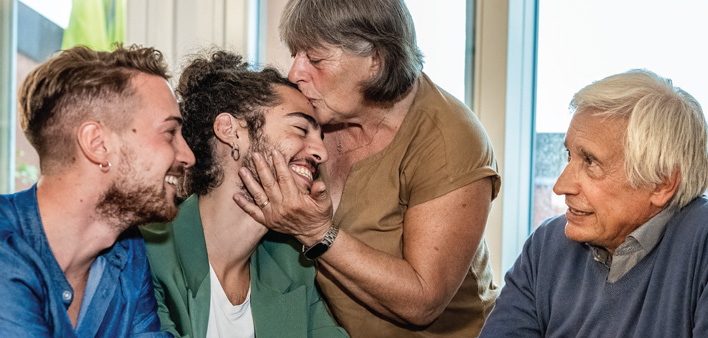Accepting & Supporting Your LGBTQ Child

By Shelley Galasso Bonanno, MA, LLP
Parenting does not come with a handbook, although many of us wish it did! But being a parent presents a myriad of scenarios, many of which we feel equipped to address, and others we feel much less equipped to handle. If you are the parent of a lesbian, gay, bisexual, transgender, questioning, or nonbinary (LGBTQ+) child, teen or adult child, providing support presents a unique set of challenges that parents often feel unprepared to navigate.
According to the Williams Institute, 9.5 percent of youths aged 13-17 identify as LGBT. It is reported there are more than eight million self identified LGBTQ people in the United States, and approximately 1.4 million people who identify as transgender. Additional research shows that eight in ten people in the U.S. personally know someone who is LGBTQ, and one in three people know someone who is transgender.
There are LGBTQ people everywhere, and there are supportive families and allies everywhere, too. So, remember, while it may initially feel isolating to learn of your child’s identification as LGBTQ, you are not alone in this process.
Family support and acceptance are critical to the health and wellbeing of people who identify as LGBTQ. Research shows that LGBTQ adolescents who are supported by their parents and families grow up to be happier and healthier adults but sometimes parents may be the last ones to know. Coming out to parents is the most difficult part for most LGBTQ youths. While it is difficult, many youths report they feel a sense of relief when their voice is finally heard by their parents. Open communication, in which parents listen without judgment, is a powerful form of validation. The more parents encourage communication, the more likely their child will feel heard, accepted, and supported.
Let your child take the lead with difficult news, particularly about telling others in the family that they identify as LGBTQ. It is your child’s choice to reveal their sexual identity to others in the family and it will likely feel more comfortable sharing their feelings with some family members than with others. Be respectful of your child’s wishes. Making sure your child knows you love and support them is essential to helping your child navigate their feelings and to feel loved and validated.
It is not unusual for parents to have mixed feelings about learning that they have a LGBTQ child for many reasons. Parents may be confused and worried about potential bullying and/or discrimination, their religious convictions, and judgment of other family members. If you find yourself struggling, reach out for help. Address your concerns with a doctor, a counselor at school, close family members or a mental health professional. Organizations such as Parents, Families and Friends of Lesbians and Gays (PFLAG) can also help provide support and guidance. Founded in 1973, PFLAG is dedicated to supporting, educating, and advocating for LGBTQ+ people and their families. With more than 325,000 members and supporters, PFLAG works to create a caring, just and affirming world for LGBTQ+ people and those who love them. Visit pflag.org for more information.
 A lifelong resident of Macomb County, Shelley Galasso Bonanno is a practicing limited licensed psychologist who earned her master’s degree from Wayne State University in 1987. She has a breadth of experience in working with adults, children, families, and couples. In addition to working in private practice, Ms. Bonanno performs consultative services for State and forensic agencies. She performs custody and parenting time evaluations and is a court approved mediator. Her writings have appeared in various online and print publications. An advocate for mental health, you can follow Ms. Bonanno on Twitter @shelleybonanno.
A lifelong resident of Macomb County, Shelley Galasso Bonanno is a practicing limited licensed psychologist who earned her master’s degree from Wayne State University in 1987. She has a breadth of experience in working with adults, children, families, and couples. In addition to working in private practice, Ms. Bonanno performs consultative services for State and forensic agencies. She performs custody and parenting time evaluations and is a court approved mediator. Her writings have appeared in various online and print publications. An advocate for mental health, you can follow Ms. Bonanno on Twitter @shelleybonanno.

